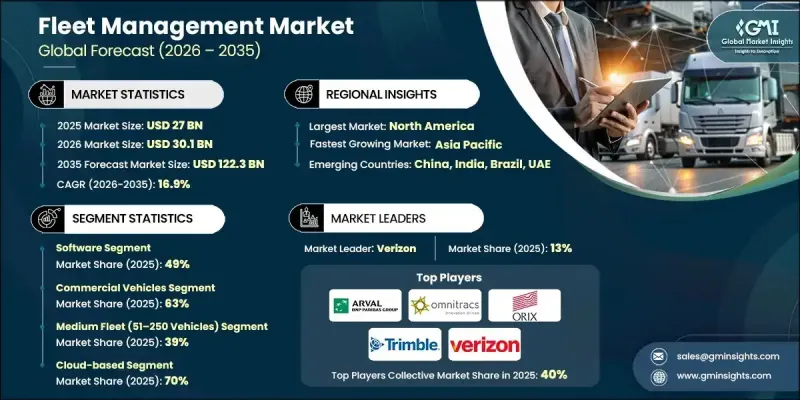
|
市場調査レポート
商品コード
1913333
フリート管理市場の機会、成長促進要因、産業動向分析、2026年~2035年の予測Fleet Management Market Opportunity, Growth Drivers, Industry Trend Analysis, and Forecast 2026 - 2035 |
||||||
カスタマイズ可能
|
|||||||
| フリート管理市場の機会、成長促進要因、産業動向分析、2026年~2035年の予測 |
|
出版日: 2025年12月16日
発行: Global Market Insights Inc.
ページ情報: 英文 225 Pages
納期: 2~3営業日
|
概要
世界のフリート管理市場は、2025年に270億米ドルと評価され、2035年までにCAGR16.9%で成長し、1,223億米ドルに達すると予測されています。

市場の力強い成長は、継続的なデジタルトランスフォーメーション、車両の電動化の進展、厳格な規制順守、そして急成長する電子商取引セクターによって推進されています。この市場は、GPS/GNSSトラッカー、テレマティクス制御ユニット、ダッシュカム、IoTセンサーなど幅広いハードウェアを網羅するとともに、フリート追跡、メンテナンス、燃料監視、分析のためのソフトウェアプラットフォームも包含しています。設置、コンサルティング、マネージドサービス、トレーニングなどの専門サービスが市場エコシステムをさらに強化しています。クラウドベースのソリューションは、従来のオンプレミスシステムと比較して、拡張性、リモートアクセス性、自動更新、インフラコストの低減を実現する重要な役割を担っています。特に中小企業は、多額のIT投資を必要とせずに高度なフリート管理機能を利用するため、SaaSモデルを活用しています。北米がこの市場をリードしており、米国は商用車の活動量の高さ、厳格な電子記録装置(ELD)義務化、先進的なテレマティクス統合、主要ソリューションプロバイダーの集中により、地域的な拡大を牽引しております。
| 市場範囲 | |
|---|---|
| 開始年 | 2025年 |
| 予測年度 | 2026-2035 |
| 開始時価値 | 270億米ドル |
| 予測金額 | 1,223億米ドル |
| CAGR | 16.9% |
ソフトウェア分野は2025年に49%のシェアを占め、2026年から2035年にかけてCAGR17.1%で成長すると予測されています。業界は技術進歩にもかかわらずハードウェアがコモディティ化する一方で、継続的な収益モデルを備えたソフトウェア中心のソリューションへと急速にシフトしています。ソフトウェアプラットフォームは、単なるデータ収集をはるかに超えた、データ集約、分析、可視化、実用的なインサイトを提供する包括的な機能により、現在市場を独占しています。このセグメントの成長は、プレミアム価格設定を正当化する高度な機能、高利益率の継続的収益をもたらすSaaSサブスクリプションモデル、そして測定可能な業務上のROIを実現するインテリジェントな意思決定ツールの採用拡大によって推進されています。
商用車セグメントは2025年に63%のシェアを占め、2026年から2035年にかけてCAGR17%で成長すると予測されています。このセグメントには、軽商用バン、中型トラック、大型トラクターが含まれます。これらの車両は年間3万マイルから10万マイル以上を走行し、地域や燃料の種類に応じて1ガロンあたり3米ドルから4.50米ドルの燃料を年間5,000ガロンから20,000ガロン消費します。小型配送トラックやサービスバンなどの小型商用車は、地域配送やサービス車両として広く活用されており、ルート最適化、生産性監視、運用効率の向上といったメリットを享受しています。
米国フリート管理市場は2025年に121億米ドルの規模に達し、2026年から2035年にかけてCAGR14.6%で成長すると予測されています。この成長は、成熟したテレマティクスエコシステム、強固なデジタルインフラ、コネクテッドカー技術の急速な普及によって支えられています。物流、運輸、公益事業、公共サービス分野のフリート運営者は、先進的なフリートソリューションの導入を加速させています。この導入は、運用効率、安全性、規制順守の向上を目指すソフトウェア開発者、テレマティクスプロバイダー、クラウドプラットフォーム企業によってさらに強化されています。
よくあるご質問
目次
第1章 調査手法
第2章 エグゼクティブサマリー
第3章 業界考察
- エコシステム分析
- サプライヤーの情勢
- 利益率分析
- コスト構造
- 各段階における付加価値
- バリューチェーンに影響を与える要因
- ディスラプション
- 業界への影響要因
- 促進要因
- 効率性とコスト削減への需要
- 自動車整備に関する規制の増加
- 電子商取引(eコマース)とラストマイル配送の台頭
- テレマティクス、モノのインターネット(IoT)、人工知能における先進技術の統合
- 持続可能性への注目の高まり
- 業界の潜在的リスク&課題
- データ過多と管理上の懸念
- ドライバー管理と安全上の課題
- 市場機会
- AI、IoT、高度な分析技術の統合による、よりスマートなフリート運営の実現
- 専用監視ツールを備えた電気自動車およびハイブリッド車フリートの導入
- 自動運転車両フリート管理ソリューション
- 新興市場および地域市場への拡大
- コネクテッドカーおよび5G対応フリート管理システム
- 成長可能性分析
- 規制情勢
- ポーター分析
- PESTEL分析
- 技術とイノベーションの動向
- 現在の技術動向
- 新興技術
- コスト内訳分析
- 特許分析
- 使用事例と成功事例
- 持続可能性と環境面
- 持続可能な取り組み
- 廃棄物削減戦略
- 生産におけるエネルギー効率
- 環境に配慮した取り組み
- カーボンフットプリントに関する考慮事項
- 将来展望と機会
第4章 競合情勢
- イントロダクション
- 企業の市場シェア分析
- 北米
- 欧州
- アジア太平洋地域
- ラテンアメリカ
- 中東・アフリカ地域
- 主要市場企業の競合分析
- 競合ポジショニングマトリックス
- 戦略的展望マトリックス
- 主な発展
- 合併・買収
- 提携・協業
- 新製品の発売
- 事業拡大計画と資金調達
第5章 市場推計・予測:コンポーネント別、2022-2035
- ハードウェア
- 車両追跡装置
- 車載診断装置(OBD)
- テレマティクス機器
- センサー
- ソフトウェア
- フリート管理ソフトウェア(FMS)
- テレマティクスプラットフォーム
- ルート最適化およびスケジューリングソフトウェア
- ドライバー行動監視ソフトウェア
- 保守管理ソフトウェア
- サービス
- 設置および統合
- データ分析とレポート作成
- 保守・サポートサービス
第6章 市場推計・予測:車両別、2022-2035
- 乗用車
- SUV
- ハッチバック
- セダン
- 商用車
- ライトデューティ
- ミディアムデューティ
- ヘビーデューティ
- 電気自動車
- 特殊車両向けフリート
- 建設・鉱山機械
- 緊急車両
- ユーティリティサービス車両
第7章 市場推計・予測:フリート規模別、2022-2035
- 小規模フリート(1~50台)
- 中規模フリート(51~250台)
- 大規模フリート(250台以上)
第8章 市場推計・予測:接続技術別、2022-2035
- GPS/GNSS
- 4G/LTE
- 5G
- Bluetooth/Wi-Fi
- 衛星通信
- IoTセンサーとCANバスの統合
第9章 市場推計・予測:展開別、2022-2035
- オンプレミス
- クラウドベース
第10章 市場推計・予測:最終用途別、2022-2035
- 輸送
- 運用管理
- ドライバー管理
- 車両追跡システム
- コンプライアンス管理
- 保守管理
- 燃料管理
- 資産追跡
- その他
- 建設
- 運用管理
- ドライバー管理
- 車両追跡システム
- コンプライアンス管理
- 保守管理
- 燃料管理
- 資産追跡
- その他
- 製造業
- 運用管理
- ドライバー管理
- 車両追跡システム
- コンプライアンス管理
- 保守管理
- 燃料管理
- 資産追跡
- その他
- 公益事業
- 運用管理
- ドライバー管理
- 車両追跡システム
- コンプライアンス管理
- 保守管理
- 燃料管理
- 資産追跡
- その他
- 医療・医薬品
- 運用管理
- ドライバー管理
- 車両追跡システム
- コンプライアンス管理
- 保守管理
- 燃料管理
- 資産追跡
- その他
- 小売業および電子商取引
- 運用管理
- ドライバー管理
- 車両追跡システム
- コンプライアンス管理
- 保守管理
- 燃料管理
- 資産追跡
- その他
- 食品・飲料/コールドチェーン
- 運用管理
- ドライバー管理
- 車両追跡システム
- コンプライアンス管理
- 保守管理
- 燃料管理
- 資産追跡
- その他
- その他
- 運用管理
- ドライバー管理
- 車両追跡システム
- コンプライアンス管理
- 保守管理
- 燃料管理
- 資産追跡
- その他
第11章 市場推計・予測:地域別、2022-2035
- 北米
- 米国
- カナダ
- 欧州
- ドイツ
- 英国
- フランス
- イタリア
- スペイン
- ロシア
- 北欧諸国
- ベネルクス
- アジア太平洋地域
- 中国
- インド
- 日本
- オーストラリア
- 韓国
- シンガポール
- タイ
- インドネシア
- ベトナム
- ラテンアメリカ
- ブラジル
- メキシコ
- アルゼンチン
- コロンビア
- 中東・アフリカ地域
- 南アフリカ
- サウジアラビア
- アラブ首長国連邦
第12章 企業プロファイル
- 世界企業
- ARI Fleet Management
- Donlen
- Element Fleet Management
- Geotab
- LeasePlan
- Omnitracs
- Orix
- Trimble
- Verizon Connect
- Wheels
- 地域企業
- Azuga
- Bestmile
- ClearPath GPS
- GPS Insights
- Inseego
- NexTraq
- Onfleet
- Teletrac Navman
- ThingTech
- TomTom Telematics
- 新興技術イノベーター
- Automile
- Fleet Complete
- KeepTruckin(Motive)
- Lytx
- Samsara


